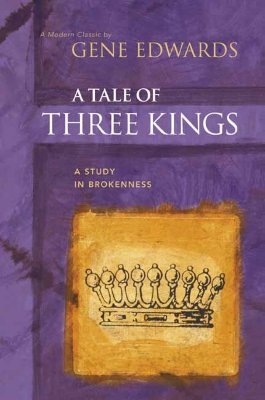A Tale of Three Kings 13th May, 2008
Posted by Scotty in Books, Heart, Leadership, Pain.trackback
 So, I have started the reading for the Conflict Resolution class that I’m taking over the summer. I have been wanting to read this one for a while and so I was glad it was assigned for class, that way I have to make the time to read it.
So, I have started the reading for the Conflict Resolution class that I’m taking over the summer. I have been wanting to read this one for a while and so I was glad it was assigned for class, that way I have to make the time to read it.
I love ‘simple’ books. There’s something wonderful about when people take Biblical truth and portray it in a way that makes it easy to understand and relevant. Gene Edwards does a great job in this book.
The book looks at three Kings, Saul, David, and Absolom, and is written as if we are angels watching David, hearing his thoughts and being allowed to enter in to the desires of his heart. It does it in two parts, by looking first at the relationship between David and Saul, when Saul is ruling the Israelites even though Samuel has anointed David to be the next king. As we look at these two people we see the characteristics of an authoritarian leader, and the godly attitude of submission God calls us to in this circumstance.
In the second part of the book, the writer moves on to the relationship between David and Absolom at the time when David is ruling and Absolom is rebelling. In this circumstance we see in David a God-following leader who is willing to relinquish his own will for God’s, and we see Absolom causing division lower in the ranks.
As a result we get to ponder our lives in 4 roles: are we a bad leader, good follower, good leader or bad follower!
My favourite aspect of the book is how it allows us to see deeper into David’s character. Gene Edwards enters into David’s brokenness, letting us see how God used David’s circumstances to instill in him such a deep and profound faith:
At night, when all the sheep lay sleeping and he sat staring at the dying fire, he would strum upon his harp and break into quiet song. He sang the ancient hymns of his forefathers’ faith. While he sang he wept, and while weeping he often broke out in abandoned praise – until mountains in distant places lifted up his praise and tears and passed them on to higher mountains until they eventually reached the ears of God. (p4)
He wove the day’s saga into a song. He hurled that hymn to the skies again and again until he had taught the melody and words to every angel that had ears. (p5)
It paints such an incredible picture of how God uses hardships in our life to draw us to Himself. It shows the amazing strength of character in David, and challenges us to trust that God is in control, and that His will is far better than our will! God calls us into roles because there are lessons we need to learn from the people over us and under us, and he puts us in those same roles because there are things that we can teach to those over us and under us. It’s not up to us to judge the people around us, it is our job to fix our eyes on God, to do our work as if we’re working for God, and to trust that He is in control of all that is going on around us.

What an awesome book. I read it over Christmas Break and then realized it was required for class last semester. It felt like God had been preparing me to read it for about 4 years since a really painful time in ministry. Keep that book in mind as you walk through the mine-field of the other books and stories of horrible ministry/church experiences (and I guess through experiences themselves). The Conflict Transformation class is so valuable, and I hope you find it to be fuel for your soul and perspective as a leader.
All of life is preparation. God wastes nothing.
I just finished this inspiring book.
I love how God uses broken individuals to accomplish amazing things. David had so many occasions to become a Saul or to stop Absalom from become one, but the memories of his brokenness kept him on the path the Lord had traced for him. My prayer is that church leaders learn to become more like David (I have already been blessed in this department), and that followers (like me) learn submission, not simply authority.